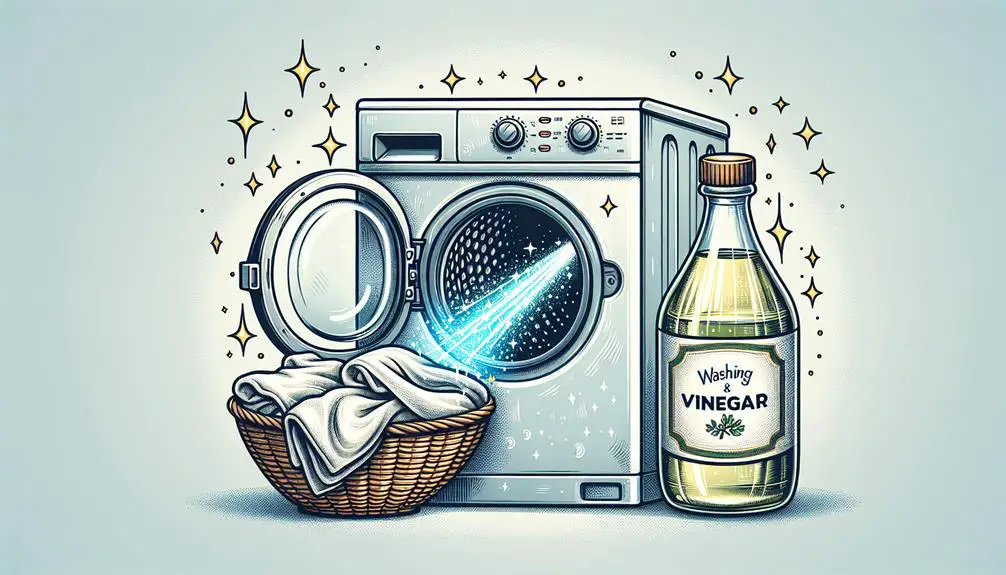I've always been a fan of using natural alternatives for my laundry, and vinegar's been my go-to for a while now, especially with tricky fabrics like linen. It's great for getting rid of odors and giving my linen that fresh feel without the harsh chemicals. But, I've heard mixed things about its long-term effects on linen fibers. Some say it's safe if you don't overdo it, while others warn it might weaken the fabric over time. It's got me wondering about the best way to incorporate vinegar into my linen care routine without risking damage. What's the real deal here?
Table of Contents
Key Takeaways
- Yes, vinegar can be used to wash linen, acting as a natural fabric softener and odor neutralizer.
- Dilute vinegar properly to avoid potential weakening of linen fibers and fabric deterioration.
- White vinegar is recommended for preserving colors and preventing fading in linen fabrics.
- Avoid using vinegar with chlorine bleach to prevent harmful fumes and possible linen damage.
- Use vinegar sparingly in the washing routine to maintain linen's quality and longevity.
Understanding Linen Fabric
Linen, made from the flax plant, is a durable and breathable fabric that's become a go-to for those of us looking for eco-friendly clothing and home goods. When I first started incorporating linen into my wardrobe and linen towels into my bathroom, I was drawn to its natural fibers and the promise of a material that gets better with age. What I've learned is that this fabric isn't just about looking good; it's about sustainability and comfort.
One thing I quickly noticed is how linen manages moisture. It's incredibly absorbent and dries faster than I expected, making it perfect for those hot, sweaty days or just after a shower. Despite its tendency to wrinkle, which honestly adds a bit of charm, linen softens in a way that makes you love it more with every laundry cycle. Speaking of laundry, its natural antibacterial properties mean it doesn't hold onto odors like synthetic fabrics do, keeping everything feeling fresh longer.
But it's not just about comfort and practicality. Knowing that linen is biodegradable and comes from a plant that requires less water and chemicals to grow makes me feel good about my choices. It's a small but meaningful way to support the planet.
The Role of Vinegar in Laundry
I've discovered that a splash of vinegar in the wash can do wonders for my linen, from keeping colors bright to softening the fabric. It's not just an old wives' tale; vinegar truly is a miracle laundry hack. Distilled white vinegar, specifically, has become my go-to, ensuring I don't accidentally bleach my beloved linen.
Here's a quick breakdown of why vinegar is my laundry superhero:
| Benefit | How It Works | Why It's Great |
|---|---|---|
| Neutralizes odors | Dissolves detergent residues | Keeps linen smelling fresh |
| Brightens colors | Sets dye in fabric | Prevents dullness from hard water |
| Treats stains | Effective on coffee/wine stains | Saves my linens from accidents |
| Softens fabric | Acts as a natural fabric softener | Eliminates the need for chemicals |
| Prevents stiffness | Removes detergent residue | Keeps linen comfortable to wear |
Vinegar's ability to break up mineral deposits and dissolve detergent residues without the harshness of chemicals makes it a standout in my laundry routine. It's a natural fabric softener that doesn't just mask problems but tackles them head-on. For anyone looking to master their linen care, integrating vinegar into your laundry regimen could be the game-changer you've been searching for.
Benefits of Washing Linen With Vinegar
Diving into the benefits of washing linen with vinegar, it's clear this household staple does more than just keep dishes clean. First off, it's a game-changer when it comes to odors. Using vinegar in laundry helps zap those nasty smells by neutralizing bacteria. Ever noticed how some clothes just don't seem bright enough? That's where vinegar steps in, dissolving those pesky detergent residues and mineral deposits, giving your linens a color boost they desperately needed.
But wait, there's more. Got a stubborn coffee spill or a wine stain that refuses to leave? Vinegar's your go-to for tackling these head-on, breaking down the stains like a pro. And if you're tired of your linens feeling a bit too stiff, vinegar acts as a natural fabric softener. That's right, ditch those chemical-laden fabric softeners and watch as vinegar speeds up the softening process, keeping your linens feeling cozy.
Plus, in the long haul, using vinegar can actually help maintain the quality and longevity of your linen fabrics. It's a win-win, protecting your precious linens from harsh chemicals while ensuring they last longer. Who knew vinegar had so much to offer?
Potential Risks to Linen
While we've seen how vinegar can breathe new life into our linens, it's worth noting that it's not all sunshine and soft fabrics. The truth is, vinegar's acidic properties come with their own set of potential risks to our beloved linen items. For starters, the acidity can actually weaken linen fibers if we're not careful, leading to fabric deterioration over time. That's a real bummer, especially for pieces we love and want to last.
Moreover, if I get too heavy-handed with the vinegar, I might end up with discoloration or even fading of colors. That's definitely not the refresh I'm looking for. And let's not forget about our linen items with delicate embroidery or those beautiful embellishments. They can be particularly vulnerable to vinegar's acidic bite, risking damage that could've been easily avoided.
Using vinegar too frequently? That's a no-go as well. It can mess with the fabric's natural texture and softness, turning what was once cozy and inviting into something less appealing. The takeaway here? Use vinegar sparingly and always dilute it properly. It's about striking the right balance to minimize these potential risks and keep our linen looking and feeling its best.
How Vinegar Affects Colors and Fibers
I've noticed that using vinegar in my linen wash does more than just clean; it actually helps keep the colors looking sharp and bright.
It's pretty cool how it tackles the minerals and gunk that can make my towels and sheets look dull.
Plus, I've read that it can even strengthen the fibers over time, which means my linens last longer.
Vinegar's Color Retention Impact
Vinegar's got this neat trick of locking in colors on your linen, ensuring they don't fade away with each wash. Its mild acidity is a game-changer for color retention impact, fighting against the dulling effects of hard water and detergent residues. You gotta use white vinegar, though, to keep your fabrics looking bright without any risk of discoloration. Just remember to dilute it for those darker shades to prevent any accidental fabric fading. And steer clear of cleaning vinegar unless you're aiming for a bleachy surprise!
| Vinegar Action | Benefit | Emotion |
|---|---|---|
| Sets dye | Prevents color fading | Relief |
| Restores color | Combats hard water harm | Satisfaction |
| Dilutes safely | Protects dark fabrics | Confidence |
Fiber Strength and Vinegar
Exploring how vinegar affects both the color and fibers of linen reveals that its mild acidity isn't just good for keeping colors bright; it also plays a role in maintaining the strength of the fabric. I've found that understanding the uses for vinegar in laundry can significantly improve how I care for my linen items. Here's what I've learned:
- Vinegar's mild acidity helps set dye, keeping linen vibrant.
- It softens linen by breaking down detergent residue.
- White vinegar is ideal, avoiding fabric discoloration.
- Overusing vinegar can harm fiber strength, so moderation is key.
- Always dilute vinegar to protect linen's color and fibers.
Vinegar Vs. Traditional Detergents
I've been looking into how vinegar stacks up against traditional detergents, especially when it comes to washing linen.
It turns out vinegar not only does a bang-up job at cleaning but also has a lesser environmental impact than many detergents.
Let's talk about why vinegar's cleaning efficacy and the green aspect might just tip the scales in its favor.
Vinegar Cleaning Efficacy
Many folks don't realize that vinegar can outperform traditional detergents when it comes to keeping linen smelling fresh and looking vibrant. Distilled white vinegar, especially, has become my go-to for laundry day. It's not just about being natural; it's about effectiveness and freshness without the harsh chemicals.
- Eliminates odors: Vinegar works wonders to remove those stubborn smells.
- Brightens colors: It helps maintain the vibrancy of my linens.
- Softens fabrics: No need for synthetic softeners here.
- Prevents color fading: The mild acidity locks in the dye.
- Cost-effective: It's a wallet-friendly option that gets the job done.
Switching to vinegar for washing linen has been a game-changer for me. It's a simple, natural way to keep everything looking and smelling great.
Detergents Environmental Impact
Switching to vinegar not only keeps my linens fresh but also significantly lowers my environmental footprint compared to using traditional detergents. It's all about making smarter, greener choices, right? Let's dive into why vinegar, with its acetic acid magic, is rocking the laundry world.
| Laundry Detergents | Alternatives to Using Vinegar |
|---|---|
| Harsh chemicals | Natural acetic acid |
| Pollutes water | Minimizes pollution |
| Non-renewable resources | Renewable resource |
| Heavy packaging | Minimal packaging |
Vinegar's not just for salads anymore. By choosing it over conventional options, I'm not only keeping my clothes clean but also protecting our planet. It's a simple swap with a big impact. Who knew acetic acid could be such a game changer in the laundry room?
Proper Vinegar Washing Techniques
To get the most out of your linen wash, adding distilled white vinegar to the laundry can work wonders. It's not just about getting them clean; it's about maintaining their quality and vibrancy. Vinegar, especially distilled white vinegar, is a bit of a miracle worker in this regard. It tackles everything from stains to stubborn odors, all while keeping your linens looking their best.
Here's how I make vinegar work for me in the laundry:
- Pre-treat stains directly: I mix equal parts water and vinegar to dab on pesky stains like coffee or wine before washing. This makes a great stain remover.
- Add vinegar to the wash: Depending on the load size, I'll use 1/2 to 1 cup of vinegar in the wash. This helps dissolve mineral deposits and neutralizes odors without harsh chemicals.
- Use vinegar to set dye: To keep my colorful linens from fading, I add vinegar during the wash cycle. It helps set the dye, ensuring the colors stay vibrant.
- Softens linen: A bit of vinegar in the rinse cycle acts as a natural fabric softener, leaving linens feeling soft.
- Remove detergent residue: Lastly, I use vinegar sparingly to help rinse out any leftover detergent residue, which can make linens stiff.
When to Avoid Vinegar With Linen
While vinegar's a champ in the laundry room, it's not always the best pick for every linen situation. Let's get into when you should steer clear of using vinegar with your linen items.
| Situation | Reason | Advice |
|---|---|---|
| Mixed with Chlorine | Creates harmful fumes | Never mix vinegar and chlorine bleach |
| Delicate Fabrics | Can damage or weaken fibers | Use cautiously or avoid |
| Linen Blends | Potential for uneven treatment | Dilute vinegar or test first |
| Frequent Use | Could lead to long-term fabric damage | Limit vinegar use |
First off, mixing vinegar and chlorine bleach is a huge no-no. We're talking about creating some seriously harmful fumes that you don't want to mess with. If you've got delicate or elastic linen fabrics, take a step back. Vinegar can be pretty harsh on these sensitive materials. And for those linen blend items, vinegar might not treat each component equally, leading to potential damage or discoloration. Lastly, even though it's tempting to go all-in with vinegar for every wash, try to keep its use in check to avoid any long-term damage to your favorite linen pieces.
Maintaining Linen's Integrity
Preserving the integrity of your linen isn't just about keeping it clean; it's about ensuring its longevity and comfort, and vinegar's a secret weapon in this battle. When I started incorporating vinegar into my linen care routine, I noticed a significant difference not just in cleanliness, but in the fabric's overall feel and durability. Let me break down why vinegar's my go-to:
- Removes mineral deposits: Hard water can leave behind minerals that stiffen fabric. A splash of vinegar in the wash helps dissolve these deposits, keeping linen soft.
- Dissolves body soils: Sweat and oils can cling to linen fibers. Vinegar cuts through these body soils, ensuring towels and sheets come out fresh.
- Acts as a natural fabric softener: Unlike commercial softeners, vinegar speeds up the softening process without leaving behind residue.
- Brightens and deodorizes: It's fantastic for lifting dullness and eliminating odors, making old linen look and smell new.
- Treats stains: Spilled some coffee? A dab of vinegar and water before a rinse can tackle those pesky stains.
Using vinegar, I've managed to extend the life of my linen, keeping it as inviting as the day I bought it.
Vinegar Alternatives for Linen Care
So, if vinegar's not your thing for washing linen, we've got some cool alternatives to try out.
Baking soda's great for tackling those stubborn smells and stains, while a dash of lemon juice can brighten up your fabrics like no other.
And for those of you looking for a gentler option, a mild detergent can do the trick without the harshness.
Baking Soda Benefits
I've found that using baking soda as an alternative to vinegar can really brighten and freshen up my linen clothes without harsh chemicals. When I add baking soda to my wash, it's like a mini makeover for my linens. Here's why:
- Baking soda acts as a natural bleach alternative, brightening linen without damaging fibers.
- It neutralizes odors, leaving linens smelling fresh without the use of perfumes.
- Tough stains seem to lift away easier, making my linens look pristine.
- It's a cost-effective solution, saving me money on specialized laundry products.
- By incorporating baking soda into my laundry routine, the quality and freshness of my linen items are maintained, ensuring they last longer and stay comfortable.
Switching to baking soda from vinegar has been a game changer for me.
Lemon Juice Solution
After seeing the benefits of baking soda, exploring lemon juice as another natural alternative for linen care caught my interest. I found out lemon juice can be a game-changer. It's not just about brightening and freshening up linens; this citrus powerhouse helps remove odors and mineral deposits like a pro. What's more, it acts as a natural fabric softener, making your linens feel cozy and comfortable without harsh chemicals.
Using lemon juice felt like unlocking a secret in laundry care. The citric acid works wonders on stains and residue, breaking them down efficiently. I even tried to mix vinegar and lemon juice for a double punch. The result? Refreshed, soft linens without a trace of stiffness. It's a refreshing and effective way to care for my linen collection, and I'm all for it.
Mild Detergent Use
Exploring mild detergents offers a gentle yet effective alternative for those of us looking to care for our linens without reaching for vinegar. For those sensitive to vinegar odors or dealing with particularly delicate items, a mild detergent can be a game-changer. It's about finding that balance between cleaning power and fabric care.
Here's why mild detergent works wonders for linen fabric:
- Gentle on delicate items, preserving their integrity.
- Effectively removes dirt and odors, keeping linens fresh without vinegar.
- Maintains linen quality, ensuring longevity.
- Suitable for those sensitive to strong scents, offering a pleasant laundry experience.
- Formulated for linen care, providing targeted cleaning.
Opting for a mild detergent means we're not just cleaning; we're preserving the beauty and durability of our linen pieces.
Tips for Fresh and Durable Linen
To keep your linen feeling fresh and lasting longer, adding a bit of vinegar to your washing routine can work wonders. It's a game-changer, honestly. Vinegar not only neutralizes odors but also breaks down those pesky mineral deposits that can make your linen feel stiff. And here's a pro tip: mix a bit of vinegar with water to treat any stains before tossing them in the wash. It's like a pre-treatment that doesn't cost you an arm and a leg.
But wait, there's more. Ever noticed how some of your brightly colored linens start looking a bit dull? Vinegar's mild acidity is fantastic for brightening colors. It dissolves detergent residues that might cling to your fabrics, ensuring the colors pop again. Plus, it acts as a natural fabric softener. Over time, your linen becomes softer without the need for those commercial softeners that can leave a residue.
Just remember, always use distilled white vinegar to avoid any chance of discoloring your fabrics. And whatever you do, don't mix vinegar and chlorine bleach. That's a no-go. It can damage your linen and is pretty dangerous. Stick to using vinegar with your regular liquid laundry detergent for the best results.
Frequently Asked Questions
What Does Vinegar Do to Linen?
I've found that vinegar works wonders on linen. It neutralizes odors, brightens colors, treats stains, and even softens the fabric. Plus, it keeps my linen fresh without the mustiness. It's a laundry game-changer!
How Long Can I Soak Linen in Vinegar?
I've found soaking my linen in vinegar for 30 minutes to 2 hours works wonders. It brightens and softens the fabric. Just remember, after soaking, wash it with detergent to get it perfectly clean.
Can I Use Vinegar and Laundry Detergent Together?
Yes, I can mix vinegar and laundry detergent together. It's a great combo for boosting cleaning power and keeping my clothes fresh. Plus, it helps with stains and keeps colors bright without damaging the fabric.
Is It OK to Put Vinegar in Washing Machine?
I've found it's totally fine to put vinegar in my washing machine. It helps remove odors and soften clothes without damaging them. Just don't mix it with bleach to avoid harmful fumes. Works like a charm!
- Recycling Nonwoven Fabrics: Is It Possible? - July 11, 2025
- Recycling Nonwoven Fabrics: Is It Possible? - July 11, 2025
- Recycling Nonwoven Fabrics: Is It Possible? - July 11, 2025







